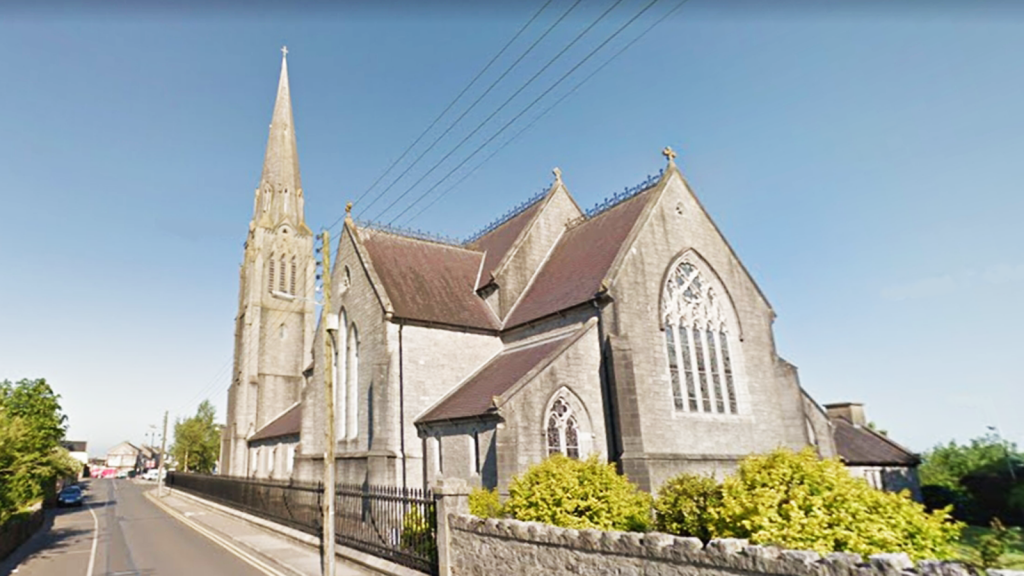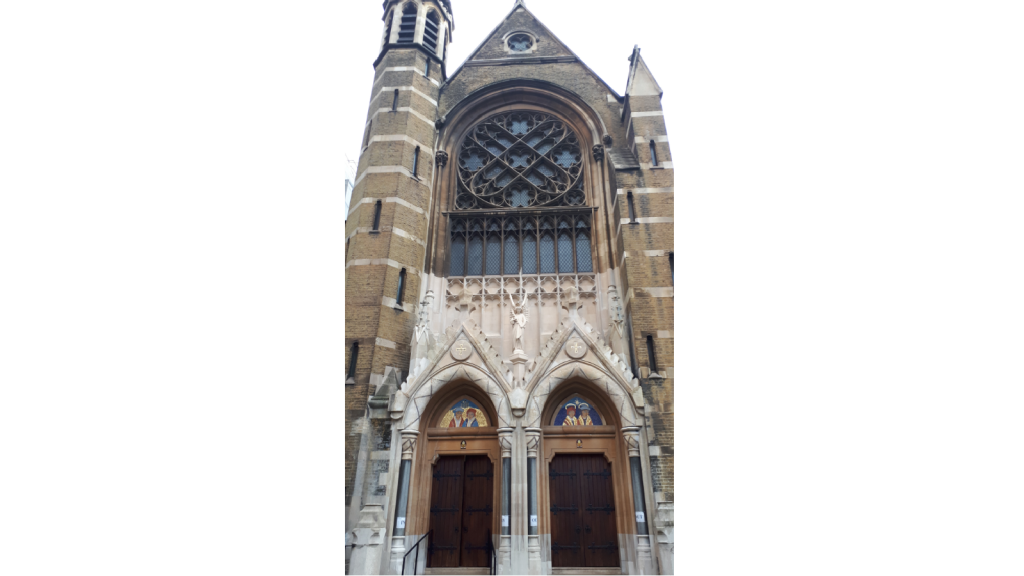Churches of the Day
Pictorial Thought for Today
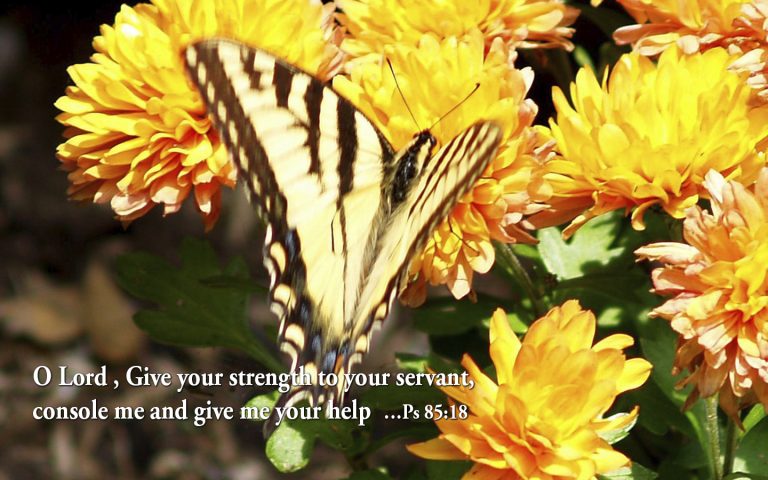
Photo by Hilary Musgrave
Jun 17 - St Moling Luachra, (614-696) wonderworker
Patrick Duffy traces what the traditions are about this saint.
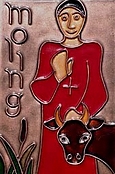 <This enamel image of St Moling (also Mullins) is by craftswoman Anne Murphy of Eala Enamels at Slyguff, Bagnelstown, Co Carlow.
<This enamel image of St Moling (also Mullins) is by craftswoman Anne Murphy of Eala Enamels at Slyguff, Bagnelstown, Co Carlow.Extraordinary Birth and Rescue
Moling was born in 614 in Sliabh Luachra in Kerry. His mother was from Sliabh Luachra, but his father was the wealthy Faelán the Fair, probably from Leinster, who became infatuated with his wife's sister, Eamhnaid, while she was visiting them in Leinster. When the girl got back home to Sliabh Luachra, in her shame she gave birth to her baby boy out in the snow - 'prodigious snow, so that it reached men's shoulders', and was about to kill him. Fortunately, both mother and child were rescued by two monks Brénainn and Collanach his priest.
Education
Collanach baptised the boy, calling him Taircell. He brought him up at his school for sons of wise men and nobles. When Taircell had completed his own studies, he taught the other boys at the school. Collanach trained him for the priesthood and Brénainn said it was his destiny to found a dwelling (atrebh) at Rinn Ros Broic ("Badger's wood point") on the brink of the Barrow. Around this time his name changes to Moling as a result of three great leaps (Were these overcoming evil phantoms or tempatations that attacked him?)
St Mullins
On his journey to the Barrow to found his dwelling, Moling came to a place called Aghacainidh ("Kennedy's Field"), where he established a monastery. A man of great physical strength and energy, he is renowned for cutting single-handed a mill-race a mile long (which can still be traced) for his community. He refused to wash or drink from it until it was completed. The place then came to be called Teach Moling ("The house of Moling") and later in English, St Mullins.
Glendalough and Ferns
Whether before or during his time at St Mullins, Moling also exercised some responsibility for the church of Glendalough and later in the church of Ferns, where he is said to have been the second bishop, successor to Aidan or Maedhóg.
Freed the Leinster Men of the Ború ("cattle tax")
One of the great deeds attributed to St Moling is that in 674 he begged Finaghta the Festive to renounce solemnly for himself and his successors the ború (= "tribute") or annual cattle tax which for generations the kings of Meath (at Tara) had exacted from the Leinstermen. This was regarded as a great feat by the Leinster men who greatly honoured Moling for it.
Moling and the Foxes
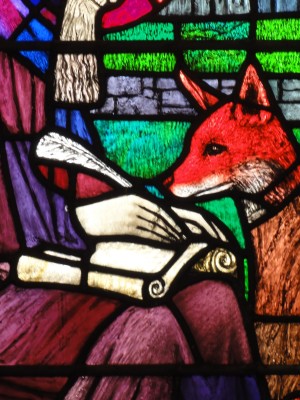 Moling, like St Francis, is said to have loved animals, many of whom - wild and tame - he kept around him in honour of their Maker, and they would eat out of his hand. Among them was a fox, who one day stole a hen that belonged to the monks and ate it. The monks complained to Moling, who scolded the fox. The fox, seeing his master's anger, went off to the nearby convent, and brought back a hen and placed it, safe and sound, at Moling's feet. Moling, smiling, said to the fox: 'You offer plunder to atone for theft. Take back this hen unharmed to the sisters. And from now on you must live without stealing.' The fox took the hen back to the nuns. Both monks and nuns rejoiced and blessed God.
Moling, like St Francis, is said to have loved animals, many of whom - wild and tame - he kept around him in honour of their Maker, and they would eat out of his hand. Among them was a fox, who one day stole a hen that belonged to the monks and ate it. The monks complained to Moling, who scolded the fox. The fox, seeing his master's anger, went off to the nearby convent, and brought back a hen and placed it, safe and sound, at Moling's feet. Moling, smiling, said to the fox: 'You offer plunder to atone for theft. Take back this hen unharmed to the sisters. And from now on you must live without stealing.' The fox took the hen back to the nuns. Both monks and nuns rejoiced and blessed God.The fox and the Book
Another time a fox stole a book from the community and hid it, intending to come back shortly and chew it up. But when he came back to the monastery, the monks found the fox stealing and eating a honeycomb. They brought the fox to Moling, accusing him of stealing the book. Moling bade them let the fox go free, but he said to the fox: 'Be off, you crafty creature! Bring me back that book unharmed, and quickly.' Off went the fox, brought back the book, setting it down at the saint's feet, as if seeking forgiveness. 'Get up, you wretch,' said Moling, 'and never touch a book again.' Ever after, whenever any one would jokingly show the fox a book, he immeditely took to flight (Plummer, Latin Life of Moling).
Places where Moling is Remembered
Moling is remembered in Brosna, Co Kerry, where St Moling's well (restored in 1998 by the Brosna Heritage Group) still draws pilgrims. The George Ashlin-designed Catholic church in the village, built in 1868, is dedicated to St Moling and St Carthage.
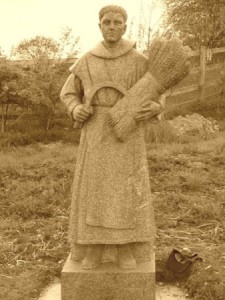
At St Mullins (in Irish, Teach Moling), Co Carlow, there is a large graveyard containing the remains of a small round tower, a range of small churches, one of which is said to contain Moling's grave. There is also a well dedicated to him and people still point to the mile-long mill race Moling is said to have cut with his own hands.
At Monamolin (Irish Muine Moling = "thicket of Moling"), Co Wexford, not far from Ferns, the name of the village and the local Catholic Church commemorate the saint. There is also a story that when Moling was crossing a small hill here, an evil spirit annoyed him and that when he knelt on a rock to curse the spirit, the impression of his knees was left on the stone. Although this stone cannot now be traced, the townland is called Cloch na Mallacht, i.e. "the stone of the curses". A St. Moling's Well is situated on the parochial lands at Glebe.
The Book of Moling and its Shrine
The Book of Moling is an Irish pocket Gospel Book from the last half of the 8th century preserved in Trinity College Library, Dublin. There is also a jeweled shrine, which was its container. The text includes the four Gospels, a service which includes the "Apostles Creed", and a plan of St. Moling's monastery. It has portraits of Matthew, Mark and John. It may have been copied from an autograph manuscript of St. Moling.
[caption id="attachment_46689" align="alignleft" width="181"]
 The one handed statue of Saint Moling and a poor box. This is a well on a substantial site in the middle of nowhere; but that is part of its rare beauty.[/caption]
The one handed statue of Saint Moling and a poor box. This is a well on a substantial site in the middle of nowhere; but that is part of its rare beauty.[/caption]The Birth of Moling and his Life
Online one can find Geinemain Molling ocus a bhetae ("The birth of Moling and his life"), an Irish text transcribed in 1628 by Mícheál Ó Cléirigh, one of the the compilers of the Annals of the Four Masters, edited in Irish and translated into English in 1907 by Whitley Stokes.
It contains a series of extraordinary stories that sound very strange to modern readers, but as the literary genre is medieval hagiography, and not modern biography, one needs to be versed in the peculiarities of that genre to correctly interpret it.
Presentation Sister Máire de Paor (Sister Declan of Bagnelstown) has analysed this text in a recent book, St Moling Luachra, giving an enlightening hypothesis of what the author was trying to convey through this genre of writing.
Monday of the Eleventh Week in Ordinary Time, Year 2
FIRST READING
A reading from the first Book of Kings 21: 1-16
Naboth has been stoned to death.
Naboth of Jezreel had a vineyard close by the palace of Ahab king of Samaria, and Ahab said to Naboth,
'Give me your vineyard to be my vegetable garden, since it adjoins my house;
I will give you a better vineyard for it or, if you prefer, I will give you its worth in money'.
But Naboth answered Ahab,
'The Lord forbid that I should give you the inheritance of my ancestors!
Ahab went home gloomy and out of temper at the words of Naboth of Jezreel,
'I will not give you the inheritance of my fathers'.
He lay down on his bed and turned his face away and refused to eat. His wife Jezebel came to him.
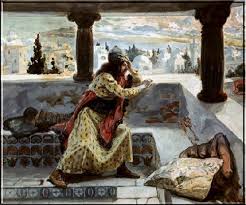
'Why are you so dispirited' she said 'that you will not eat?'
He said,
'I have been speaking to Naboth of Jezreel; I said: Give me your vineyard either for money or, if you prefer, for another vineyard in exchange.
But he said, "I will not give you my vineyard".'
Then his wife Jezebel said,
'You make a fine king of Israel, and no mistake! Get up and eat; cheer up, and you will feel better; I will get you the vineyard of Naboth of Jezreel myself.'
So she wrote letters in Ahab's name and sealed them with his seal, sending them to the elders and nobles who lived where Naboth lived. In the letters she wrote,
'Proclaim a fast, and put Naboth in the forefront of the people.
Confront him with a couple of scoundrels who will accuse him like this, "You have cursed God and the king." Then take him outside and stone him to death.'
The men of Naboth's town, the elders and nobles who lived in his town, did what Jezebel ordered, what was written in the letters she had sent them. They proclaimed a fast and put Naboth in the forefront of the people. Then the two scoundrels came and stood in front of him and made their accusation, 'Naboth has cursed God and the king'.
They led him outside the town and stoned him to death.
They then sent word to Jezebel, 'Naboth has been stoned to death'.
When Jezebel heard that Naboth had been stoned to death, she said to Ahab,
'Get up! Take possession of the vineyard which Naboth of Jezreel would not give you for money,
for Naboth is no longer alive, he is dead.'
When Ahab heard that Naboth was dead, he got up to go down to the vineyard of Naboth of Jezreel and take possession of it.
The Word of the Lord Thanks be to God.
Responsorial Psalm Ps 5:2-3, 5-7, Rv 2
Response Give heed to my groaning, O Lord.
I. To my words give ear, O Lord, give heed to my groaning.
Attend to the sound of my cries, my King and my God. Response
2. You are no God who loves evil; no sinner is your guest.
The boastful shall not stand their ground before your face. Response
3. You hate all who do evil: you destroy all who lie.
The deceitful and bloodthirsty man the Lord detests Response
Gospel Acclamation Jn 14: 23
Alleluia, alleluia!
If anyone loves me he will keep my word,
and my Father will love him, and we shall come to him .
Alleluia!
or Ps 118 : 105
Alleluia, alleluia!
Your word is a lamp for my steps and a light for my path.
Alleluia!
GOSPEL
The Lord be with you. And with your spirit
A reading from the holy Gospel according to Matthew 5: 38-42 Glory to you, O Lord
I say this to you: offer the wicked man no resistance.
Jesus said to his disciples:
'You have learnt how it was said: Eye for eye and tooth for tooth.

But I say this to you: offer the wicked man no resistance.
On the contrary, if anyone hits you on the right cheek, offer him the other as well;
if a man takes you to law and would have your tunic, let him have your cloak as well.
And if anyone orders you to go one mile, go two miles with him.
Give to anyone who asks, and if anyone wants to borrow, do not turn away.
The Gospel of the Lord. Praise to you, Lord Jesus Christ.
********************
Gospel Reflection Monday, Eleventh Week in Ordinary Time Matthew 5:38-42
Those in positions of power can be very tempted to seize land that doesn’t belong to them, often with deadly consequences for others. The war in Ukraine and is a very obvious example of such behaviour. We find it again in our first reading. King Ahab wanted a vineyard that belonged to Naboth to use as a vegetable garden because it lay alongside the land holding of the king. Understandably, Naboth refused the request of the king. This was land that had been in his family for generations. People who fight to defend their land often do so because they know that they have an historical claim to their land. Ahab’s wife was less scrupulous than Ahab, and she arranged to have Naboth condemned to death by stoning on trumped up charges. That too has a contemporary ring to it. Those who want to hang on to power at all costs find ways to silence or do away with political opponents. The combination of Ahab’s greed and Jezebel’s unscrupulous nature meant Ahab got his vineyard and Naboth lost his life. When land or territory becomes more important than human life, terrible things happen.
The teaching of Jesus in today’s gospel reading could not be further from the behaviour of Ahab and his wife in the first reading. Great evil was done to Naboth. How is evil to be dealt with and addressed. Jesus declares in the gospel reading that evil is not to be responded to with more evil. The principal of ‘eye for eye’ leaves everyone blind. Jesus calls on us to overcome evil with goodness. It can be difficult to know what that means in practice, especially in a war situation. Yet, the principle of overcoming evil with goodness is worth holding on to, especially when the temptation is very strong to keep returning evil with more evil.
________________________________
The Scripture Readings are taken from The Jerusalem Bible, published 1966 by Darton, Longman & Todd Ltd. and used with the permission of the publishers. http://dltbooks.com/
The Scripture Reflection is made available with our thanks from his book Reflections on the Weekday Readings 2024: The Word is near to you, on your lips and in your heart by Martin Hogan and published by Messenger Publications 2022/23, c/f www.messenger.ie/bookshop/
Sliocht as an céad Leabhar Ríthe 21:1-16
Maraíodh Nábót le clocha!
Bhí fíonghort ag Nábót ó Izréil láimh le pálás Acháb rí na Samáire. Dúirt Acháb le Nábót:
“Tabhair dom d’fhíonghort chun go mbeadh sé agam mar luibhghort, mar tá sé cóngarach do mo theach.
Tabharfaidh mé fíonghort níos fearr duit air, nó, más fearr leat é, tabharfaidh mé a luach duit in airgead.”
Ach d’fhreagair Nábót Acháb:

“Nár lige an Tiarna go dtabharfainn oidhreacht mo shinsir duit!”
Chuaigh Acháb abhaile agus gruaim agus crá air mar gheall ar fhocail Nábót ó Izréil:
“Ní thabharfaidh mé oidhreacht mo shinsear duit.”
Luigh sé ar a leaba agus d’iompaigh a aghaidh ó radharc agus dhiúltaigh sé bia a ithe.
Tháinig Ízeibil a bhean chéile chuige.
“Cén fáth a bhfuil oiread drochmhisnigh ort agus nach n-íosfá?” ar sise.
Dúirt sé:
“Bhí mé ag caint le Nábót ó Izréil. Arsa mise leis: ‘Tabhair dom d’fhíonghort ar airgead, nó, más fearr leat é, tabharfaidh mé fíonghort eile duit mar mhalairt air.’ Ach dúirt seisean: ‘Ní thabharfaidh mé m’fhíonghort duit.’”
Ansin dúirt Ízeibil a bhean:
“Is breá an rí ar Iosrael thusa, gan amhras! Éirigh agus ith leat; bíodh misneach ort;
gheobhaidh mise féin fíonghort Nábót ó Izréil duit.”
Scríobh sí litreacha in ainm Acháb, más ea, agus chuir sí a shéala orthu agus chuir sí iad chuig na seanóirí agus na huaisle a bhí ina gcónaí san aon chathair le Nábót. Scríobh sí sna litreacha:
“Fógraigí troscadh agus cuirigí Nábót chun tosaigh ar an bpobal. Cuirigí cúpla scraiste os a choinne a dhéanfaidh é a chúiseamh mar seo: ‘Mhallaigh tú Dia agus an rí.’ Tugaigí amach ansin é agus maraigí le clocha é.”
Rinne muintir a chathrach, na seanóirí agus na huaisle a bhí ina gcónaí ina chathair, an rud a d’ordaigh Ízeibil dóibh, mar a bhí scríofa sna litreacha a sheol sí chucu. D’fhógair siad troscadh agus chuir siad Nábót chun tosaigh ar an bpobal. Ansin tháinig an dá scraiste, shuigh siad os a chomhair agus rinne siad cúiseamh ina aghaidh os comhair an phobail á rá:
“Chuir Nábót a mhallacht ar Dhia agus ar an rí.”
Thug siad amach as an gcathair é agus mharaigh le clocha é.
Ansin chuireadar teachtaireacht chuig Ízeibil: Maraíodh Nábót le clocha!
Nuair a chuala Ízeibil gur maraíodh Nábót le clocha, dúirt sí le hAcháb:
“Éirigh! Glac seilbh ar an bhfíonghort nach dtabharfadh Nábót ó Izréil duit ar airgead
mar ní beo do Nábót feasta ach marbh!”
Nuair a chuala Acháb go raibh Nábót marbh, d’éirigh sé le dul síos chuig fíonghort Nábot ó Izréil le seilbh a ghlacadh air.
Briathar an Tiarna Buíochas le Dia
Salm le Freagra Sm 5
Freagra Éist le m’osna, a thiarna
1. Tabhair cluas do mo bhriathar, a Thiarna, agus éist le m’osna.
Claon chun glór mo ghuí, a Rí liom is a Dhia! Freagra
2. Ní Dia tú lenarb áil an urchóid: ní mhaireann an t-olc leat.
Ní sheasfaidh an scaothaire an fód os comhair do shúl. Freagra
3. Is gráin leat lucht oibrithe an oilc; scriosann tú lucht éithigh.
Is fuath leis an Tiarna an fear fuilteach agus an cealgaire claon. Freagra
SOISCÉAL
Go raibh an Tiarna libh. Agus le do spiorad féin
Sliocht as an Soiscéal naofa de réir Naomh Matha 5:38-42 Glóir duit, a Thiarna
Deirimse libh gan seasamh in aghaidh an drochdhuine.
San am sin dúirt Íosa lena

“Chuala sibh go ndúradh: ‘Súil ar shúil, fiacail ar fhiacail.’
Ach is é a deirimse libh gan seasamh in aghaidh an drochdhuine: ina ionad sin,
an té a thugann buille sa leiceann dheas duit, iompaigh chuige an leiceann eile freisin; agus an té a chuirfeadh an dlí ort chun do léine a bhreith uait, scaoil leis do bhrat chomh maith.
An té a chuireann d’fhiacha ort dul aon mhíle amháin leis, gabh leis an dá mhíle.
An té a iarrann rud ort, tabhair dó é, agus an té arb áil leis iasacht uait, ná tabhair leis do chúl.
Soiscéal an Tiarna. Moladh duit, a Chriost
AN BÍOBLA NAOFA
© An Sagart
Twelfth Sunday in Ordinary Time
In the midst of the questions that life gives rise to, do we have the faith and trust that Jesus asks for?
The love of the Lord is everlasting and God will see justice done in his own good time.
If a believer is disappointed, it is because of a lack of understanding and trust in God.
FIRST READING
A reading from the book of the Prophet Job 3:1.8-11
Here your proud waves shall break.

From the heart of tempest the Lord gave Job his answer. He said:
Who pent up the sea behind closed doors when it leapt tumultuous out of the womb,
when I wrapped it in a robe of mist and made black clouds its swaddling bands;
when I marked the bounds it was not to cross and made it fast with a bolted gate?
Come thus far, I said, and no farther: here your proud waves shall break.
The Word of the Lord Thanks be to God.
Responsorial Psalm Ps 106
Response O give thanks to the Lord, for his love endures for ever.
or Alleluia
1. Some sailed to the sea in ships to trade on the mighty waters.
These men have seen the Lord's deeds, the wonders he does in the deep. Response
2. For he spoke; he summoned the gale. tossing the waves of the sea
up to heaven and back into the deep; their soul melted away in their distress. Response
3. Then they cried to the Lord in their need and he rescued them from their distress
He stilled the storm to a whisper: all the waves of the sea were hushed. Response
4. They rejoiced because of the calm and he led them to the haven they desired.
Let them thank the Lord for his love, the wonders he does for men. Response
SECOND READING
A reading from the second letter of St Paul to the Corinthians 5:14-17
Now the new creation is here.
 Now the new creation is here.
Now the new creation is here.The love of Christ overwhelms us when we reflect that if one man has died for all, then all men should be dead; and the reason he died for all was so that living men should live no longer for themselves,
but for him who died and was raised to life for them.
From now onwards, therefore,
we do not judge anyone by the standards of the flesh.
Even if we did once know Christ in the flesh, that is not how we know him now.
And for anyone who is in Christ,
there is a new creation; the old creation has gone, and now the new one is here.
The Word of the Lord Thanks be to God.
Gospel Acclamation Eph 1:17. 18
Alleluia, alleluia!
May the Father of our Lord Jesus Christ enlighten the eyes of our mind,
so that we can see what hope his call holds for us.
Alleluia!
Or Lk 7:16
Alleluia, alleluia!
A great prophet has appeared among us; God has visited his people.
Alleluia!
GOSPEL
The Lord be with you And with your spirit.
A reading from the Gospel according to Mark 4:35-41 Glory to you, O Lord.
'Who can this be? Even the wind and the sea obey him.'
With the coming of evening, Jesus said to his disciples,
'Let us cross over to the other side.'
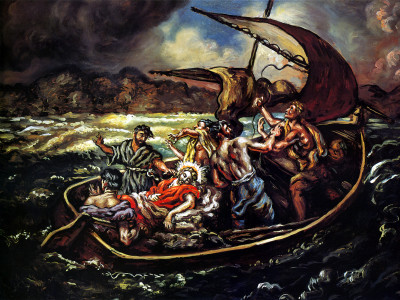 And leaving the crowd behind they took him, just as he was, in the boat; and there were other boats with him. Then it began to blow a gale and the waves were breaking into the boat so that it was almost swamped. But he was in the stern, his head on the cushion, asleep. They woke him and said to him, 'Master, do you not care? We are going down!'
And leaving the crowd behind they took him, just as he was, in the boat; and there were other boats with him. Then it began to blow a gale and the waves were breaking into the boat so that it was almost swamped. But he was in the stern, his head on the cushion, asleep. They woke him and said to him, 'Master, do you not care? We are going down!'And he woke up and rebuked the wind and said to the sea,
'Quiet now! Be calm!'
And the wind dropped, and all was calm again.
Then he said to them, 'Why are you so frightened?
(Christ calms the Storm by G de Chirico) How is it that you have no faith?'
They were filled with awe and said to one another, 'Who can this be? Even the wind and the sea obey him.'
The Gospel of the Lord Praise to you, Lord Jesus Christ.
For homily resources for this Sunday's Gospel click here: https://www.catholicireland.net/sunday-homily/
Taken from THE JERUSALEM BIBLE, published and copyright 1966 by Darton, Longman and Todd Ltd and Doubleday, a division of Random House Inc, and used by permission of the publishers.
For homily resources for this Sunday's Gospel click: https://www.catholicireland.net/sunday-homily/
Sliocht as an Leabhar Iób, Fáidh. 38:1. 8-11
Anseo a theilgfear do thonnta uaibhreacha droim ar ais.
D’fhreagair an Tiarna Iób ansin as an anfa gaoithe agus dúirt:
Cé a d’iaigh an mhuir isteach le comhlaí,

Nuair a bhrúcht sí amach as an mbroinn?
Nuair a chuir mé an néal mar éide uirthi,
Agus an scamall dubh mar bhindealán uimpi.
Chuir mé teorainn léi,
Agus shocraigh mé barraí agus doirse di.
Agus dúirt mé:
An fad seo a thiocfaidh tú, ach gan teacht thairis seo;
Anseo a theilgfear do thonnta uaibhreacha droim ar ais.”
Briathar an Tiarna Buíochas le Dia
Salm le Freagra Sm 106
Freagra Ceiliúraigí an Tiarna óir maireann a ghrá go síorai.
Malairt Freagra Alleluia!
I. An mhuintir a sheol an mhuir i longaa dhéanamh tráchtála ar an aigéan ollmhór,
chonaic siad oibreacha an Tiarna agus a iontais san fharraige. Freagra
2. Labhair seisean agus mhúscail gaoth na doininne, thóg tonnta na mara suas go hard.
D'éirigh siad chun na spéartha is thit chun an duibheagáin; bhí a n-anam á shnoí sa ghátar. Freagra
3. Agus scread siad ar an Tiarna ina n-anacair, agus sheol sé as a dtrioblóidí amach iad.
Chiúnaigh sé an t-anfa go raibh ina leoithne, agus thit tonnta na mara ina dtost. Freagra
4. Bhí lúcháir orthu toisc iad a bheith ciúin; agus threoraigh sé iad chun cuain a méine.
Gabhaidís buíochas leis .an Tiarna as ucht a ghrá agus as ucht a iontas do chlann na ndaoine. Freagra
DARA LÉACHT
Sliocht as céad Litir Naomh Pól chuig Coirintigh 5:14-17
Tá gach rud cruthaithe as an nua.
 A bhráithre, tá grá do Chríost dár dtiomáint ón uair a d’aithníomar go bhfuair aon duine amháin bás ar son cách uile agus dá réir sin go bhfuil an uile dhuine tar éis bháis. Agus fuair sé bás ar son cách d’fhonn is nach ar mhaithe leo féin a mhairfeadh na beo feasta ach ar mhaithe leis an té sin a fuair bás ar a son agus a d’aiséirigh ó mhairbh.
A bhráithre, tá grá do Chríost dár dtiomáint ón uair a d’aithníomar go bhfuair aon duine amháin bás ar son cách uile agus dá réir sin go bhfuil an uile dhuine tar éis bháis. Agus fuair sé bás ar son cách d’fhonn is nach ar mhaithe leo féin a mhairfeadh na beo feasta ach ar mhaithe leis an té sin a fuair bás ar a son agus a d’aiséirigh ó mhairbh.As seo amach dá bhrí sin ní dhéanaimid neach ar bith a mheas do réir caighdeáin shaolta. Más ea féin go ndearnamar Críost a mheas de réir an chaighdeáin sin tráth, ní dhéanaimid amhlaidh a thuilleadh.
Mar, aon duine atá i gCríost, is duine é atá cruthaithe as an nua; tá an sean i léig, féach, agus tá an nua tagtha.
Briathar an Tiarna Buíochas le Dia
Alleluia Véarsa Lc 7: 16
Alleluia, alleluia!
Tá fáidh mór éirithe inar measc”; Rinne Dia a phobal a fhiosrú.
Alleluia!
SOISCÉAL
Go raibh an Tiarna libh. Agus le do spiorad féin
Sliocht as Soiscéal naofa de réir Naomh Marcas 4:35-41 Glóir duit, a Thiarna.
Cé hé an duine seo a rá go ndéanann gaoth agus farraigí rud air?
Nuair a bhí an tráthnóna ann an lá sin, dúirt Íosa lena dheisceabail :
“Téimis trasna anonn.”
Agus ag fágáil an tslua ina ndiaidh, thug siad leo é sa bhád mar a bhí sé, agus bhí báid eile á thionlacan.
 D’éirigh cuaifeach mór gaoithe, agus bhí na farraigí ag bualadh an bháid sa chaoi go raibh sí ag líonadh cheana féin. Bhí sé féin i ndeireadh an bháid ina chodladh agus a cheann ar an bpillín, agus mhúscail siad é agus dúirt leis:
D’éirigh cuaifeach mór gaoithe, agus bhí na farraigí ag bualadh an bháid sa chaoi go raibh sí ag líonadh cheana féin. Bhí sé féin i ndeireadh an bháid ina chodladh agus a cheann ar an bpillín, agus mhúscail siad é agus dúirt leis:“A Mháistir, an ea nach cás leat go bhfuil an bás againn?”
Agus ar dhúiseacht dó, bhagair sé ar an ngaoth agus dúirt leis an bhfarraige:
“Éist, bí socair!” Agus thit an ghaoth, agus bhí sé ina théigle mhór.
Dúirt sé leo:
“Cén fáth a bhfuil an eagla seo oraibh?
An ea nach bhfuil creideamh agaibh?”
Bhí uamhan agus eagla orthu agus bhí siad á rá eatarthu féin:
“Cé hé an duine seo, más ea, a rá go ndéanann gaoth agus farraige rud air?”
Soiscéal an Tiarna. Moladh duit, a Chriost
AN BÍOBLA NAOFA
© An Sagart



